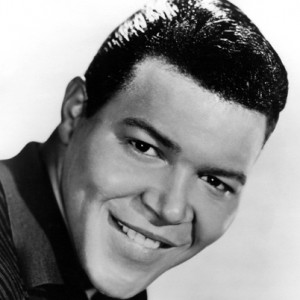 The other day I mentioned the poem about Stalin that led to Mandelstam’s exile and eventual death. Mandelstam recited it to a gathering of intellectuals at Boris Pasternak’s home one evening. Someone at that gathering informed on him. (Someone will always inform, and have their reasons. We each think it would not be us.) In any case he was first exiled to a remote village, and later, after a short reprieve, sent to a camp in Siberia, which led to his death. This is the poem. In Russian it has the rhythm and sweetness of a nursery rhyme, which contrast with its content: Continue reading “Mandelstam, Olympic trials, memories of Oregon”
The other day I mentioned the poem about Stalin that led to Mandelstam’s exile and eventual death. Mandelstam recited it to a gathering of intellectuals at Boris Pasternak’s home one evening. Someone at that gathering informed on him. (Someone will always inform, and have their reasons. We each think it would not be us.) In any case he was first exiled to a remote village, and later, after a short reprieve, sent to a camp in Siberia, which led to his death. This is the poem. In Russian it has the rhythm and sweetness of a nursery rhyme, which contrast with its content: Continue reading “Mandelstam, Olympic trials, memories of Oregon”
Month: June 2012
Poetry, repression and fame
 I stumbled across a small set of chapbooks called Bloodaxe Poetry Introductions edited by Neil Astley in the UC stacks the other morning. The first one I opened had several interesting poets new to me, including a German, a Czech, and a Romanian poet. Thinking about the poetry of Eastern Europe, one has to take into account the forces of invasion, dictatorship, and the repression of the state. A quote from a translator of Miroslav Holub, the Czech poet, highlights the latter:
I stumbled across a small set of chapbooks called Bloodaxe Poetry Introductions edited by Neil Astley in the UC stacks the other morning. The first one I opened had several interesting poets new to me, including a German, a Czech, and a Romanian poet. Thinking about the poetry of Eastern Europe, one has to take into account the forces of invasion, dictatorship, and the repression of the state. A quote from a translator of Miroslav Holub, the Czech poet, highlights the latter:
Eward Osers, recalls how Czech authorities ‘always had an uneasy feeling that in his surrealist way, Holub might be poking fun at them. When in one of his poems he spoke of “a crowd of dwarves [applauding] in the king’s palace” he was somewhat to his surprise summoned to the censor’s office. It turned out that many of the members of the Communist Party Central Committee were rather short and that passage would therefore have to be changed.
In the western world, we really don’t have to consider censorship, except self-censorship. Poetry has very little practical impact. Poetry in the west is basically ignored–the political and cultural weight that causes the Central Committee to ask that a passage be changed just doesn’t apply here. No one goes to jail here for what they say. No one, like Mandelstam, is exiled and eventually dies in a camp for his work.
And for poets who achieve recognition here–that is, that their poetry is widely read and praised–that recognition can be a kind of trap, counter to the intensely personal process of writing. The poet begins writing what the audience wants, and there is nothing worse for the creative process than that.
Holub was also a well-respected immunologist, and had this to say about his work:
 “I prefer to write for people untouched by poetry… I would like them to read poems in such a matter-of-fact manner as when they are reading the newspaper or go to football matches. I would like people not to regard poetry as something more difficult, more effeminate, or more praiseworthy.”
“I prefer to write for people untouched by poetry… I would like them to read poems in such a matter-of-fact manner as when they are reading the newspaper or go to football matches. I would like people not to regard poetry as something more difficult, more effeminate, or more praiseworthy.”
An interesting aesthetic. In any case, here’s a short poem of his from 1961.
A helping hand
We gave a helping hand to grass–
and it turned into corn.
We gave a helping hand to fire–
and it turned into a rocket.
Hestatingly,
cautiously,
we give a helping hand
to people,
to some people…
Miroslav Holub
Monday, Monday
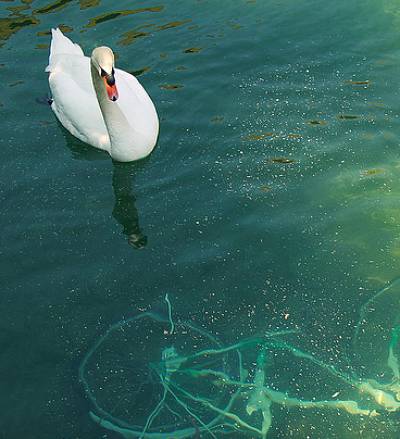 Does anyone remember the Mamas and the Papas? Of course, but only with nostalgia. Back in the 70s Larry commented that their music was dated. It startled me at the time, but of course, he was right. They are their period. This morning, talking about the implications of the election in Egypt, Larry said, “I predict a dysfunctional government. Anyone taking bets?”
Does anyone remember the Mamas and the Papas? Of course, but only with nostalgia. Back in the 70s Larry commented that their music was dated. It startled me at the time, but of course, he was right. They are their period. This morning, talking about the implications of the election in Egypt, Larry said, “I predict a dysfunctional government. Anyone taking bets?”
But Monday is also a day I look for a new poem to send to my poetry friends, and this is what I came up with today and am hereby adding to my anthology of radically accessible poetry.
The Swan at Edgewater Park Continue reading “Monday, Monday”
What’s in a metaphor?
 I have been rereading Tony Hoagland’s essays on poetry, called real sofistikashun. I’ve quoted from his poetry before. It’s a wonderfully readable book: lucid, insightful, and packed with analysis that actually illuminates what it discusses. I read it a few years ago, but it was during a bad time for me, and I didn’t absorb much. Then I loaned it to a friend, forgot about it, and recently got it back. It’s almost as if I never read it. (The benefit of failing memory, as Larry says, is that you can hide your own Easter eggs.)
I have been rereading Tony Hoagland’s essays on poetry, called real sofistikashun. I’ve quoted from his poetry before. It’s a wonderfully readable book: lucid, insightful, and packed with analysis that actually illuminates what it discusses. I read it a few years ago, but it was during a bad time for me, and I didn’t absorb much. Then I loaned it to a friend, forgot about it, and recently got it back. It’s almost as if I never read it. (The benefit of failing memory, as Larry says, is that you can hide your own Easter eggs.)
Here’s the passage that opens the chapter on metaphor:
“There is something irreconcilably, neurologically primal about the act of metaphor. This primal wildness conceals it from us. Of the hinterlands of the gray matter, where metaphors roam free, our data is all rumor, conjecture, and anecdote. Because metaphorical speech is such a commonplace, because almost anyone can and does produce metaphor on a daily basis, we assume that it is scrutable. Because it is a mental process, because it takes place in our own heads (on our property), because it leaves our own authorial lips, we assume we know something of its workings. But we do not. Invariably, the only adequate way to describe the metaphorical event is by another metaphor. It’s a mystery hand going into a black mystery box. The head says, “Fetch me a metaphor, hand,” and the hand disappears under a cloth. A moment later, the hand reappears, metaphor on its extend palm. But despite the spontaneity and ease of this event, we have only a vague idea of where the image came from. In fact, we don’t know. And neither does the hand.”
The one…
 I thought I should revisit my “Blogs I read” listing, and discovered in the process that C. Dale is no longer adding to his blog, Avoiding the Muse. But I found an interesting question there: which poem first captured your imagination? Or as he put it: many poets can trace back and name the poem that first took hold of them, excited them beyond anything …the poem that elicited almost a conversion reaction.
I thought I should revisit my “Blogs I read” listing, and discovered in the process that C. Dale is no longer adding to his blog, Avoiding the Muse. But I found an interesting question there: which poem first captured your imagination? Or as he put it: many poets can trace back and name the poem that first took hold of them, excited them beyond anything …the poem that elicited almost a conversion reaction.
Musing on Hopkins, Beckett and Louis C. K.
 Larry was getting ready last night to get up at 5:30 am and head out for his weekend softball tournament. Now that he’s turned 70, he’s moved up from the over-65 to the over-70 tournament team, and as one of the youngest players, he’s in demand. He mentioned that he had to lay out all his gear, and I quoted “gear and tackle and trim,” referencing Hopkins’ Pied Beauty. It turns out Larry doesn’t care for Hopkins, and though I brought up The Northon Anthology of English Literature, Volume II, and did my best, he was unmoved. Nonetheless, the echoes of memorized lines enrich my encounter with the world in a delicious way.
Larry was getting ready last night to get up at 5:30 am and head out for his weekend softball tournament. Now that he’s turned 70, he’s moved up from the over-65 to the over-70 tournament team, and as one of the youngest players, he’s in demand. He mentioned that he had to lay out all his gear, and I quoted “gear and tackle and trim,” referencing Hopkins’ Pied Beauty. It turns out Larry doesn’t care for Hopkins, and though I brought up The Northon Anthology of English Literature, Volume II, and did my best, he was unmoved. Nonetheless, the echoes of memorized lines enrich my encounter with the world in a delicious way.
 And in the process, I realized how rare it is now to take down a doorstop of a volume, look through an index, and find a poem. Mostly, it’s just Google. But having the anthology open on the kitchen table led to my reading a snippet from Beckett’s Molloy: Continue reading “Musing on Hopkins, Beckett and Louis C. K.”
And in the process, I realized how rare it is now to take down a doorstop of a volume, look through an index, and find a poem. Mostly, it’s just Google. But having the anthology open on the kitchen table led to my reading a snippet from Beckett’s Molloy: Continue reading “Musing on Hopkins, Beckett and Louis C. K.”
What’s news?
 The air you breathe may be killing you. More at 11.
The air you breathe may be killing you. More at 11.
Okay, this isn’t a real leader for the news, but it represents the whole take on news these days–the scarier the better. I remember Emily Littella’s protest against “violins on television,” and the Kingston Trio’s Merry Minuet. There is always so much to worry about!
Czesław Miłosz wrote “What is needed in misfortune is a little order and beauty.”
And so I rely on Larry to filter the news for me, as he provides a little order and beauty. We were wondering the other day why the comic strip “Pogo” seems to have disappeared while so many others (Peanuts, for example) continue long after the creator’s death. Walt Kelly, the strip’s creator, was aware that buffoons were spread equally among all parties and denominations, and coined the famous phrase “We have met the enemy, and he is us.”
Yesterday Larry was talking about the world’s money woes, and noted that economists track something called the “velocity of money,” or how quickly money circulates. The more it slows down, the less of it around for all. He remembered reading a British economist who summarized this with a pity quote:
“The busy shilling does more work than the lazy pound.”
Last year for my Christmas card, I sent out this little poem:
Meditation on Money
I am thinking about a day forty years ago
when we were down to our last fifty cents,
and our friends drove up
with a month’s rent and groceries,
and after we ate and talked, we sat together
on the edge of the dock, saying nothing,
and watched the barnacles
slowly open their feathery lips,
slowly close them.
And that’s enough for this blog on the financial crisis.
Though I do want to add a big thank you to Melissa Donovan, who restored the format of the blog which had mysteriously deconstructed. Yay for Melissa and her unfailing help.
Newbies
Actually , new bees! Those of you who have been following this blog may remember the great adventure of the Haengekorb, in which my friend Laurie and I went to Sebastapol and bought a unique hanging basket hive, because I wanted bees and she had a swarm. we set up the hive, Laurie donned her bee suit and dumped the swarm in, and they seemed to settle happily. But several months later, after building a small amount of comb and storing some honey, they disappeared.
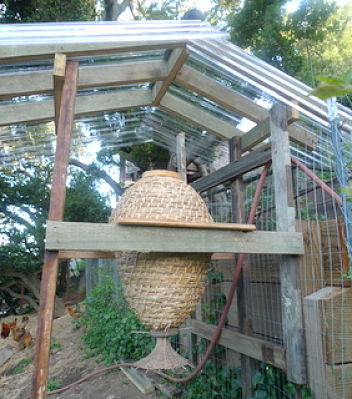 I moved the Haengekorb to a new, sunnier spot, with a new roof. It’s not nearly as elegant as it was hanging from the tree, but much more practical. Even romantic farmers need to take reality int account from time to time. For one thing, I don’t need a ladder to get into the hive now, and it’s much more protected from rain. I finished this project last Saturday, and on Monday night, got a call about a bee swarm. I grabbed my veil and gloves and drove out to El Sobrante. Continue reading “Newbies”
I moved the Haengekorb to a new, sunnier spot, with a new roof. It’s not nearly as elegant as it was hanging from the tree, but much more practical. Even romantic farmers need to take reality int account from time to time. For one thing, I don’t need a ladder to get into the hive now, and it’s much more protected from rain. I finished this project last Saturday, and on Monday night, got a call about a bee swarm. I grabbed my veil and gloves and drove out to El Sobrante. Continue reading “Newbies”
Sunday breakfast from the backyard
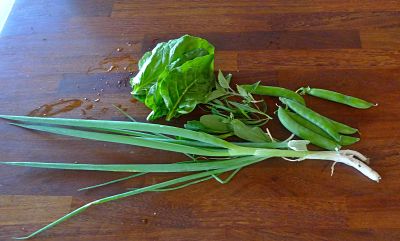 Today is a perfect Bay Area gem: warm, no fog looming, and the garden flourishing.
Today is a perfect Bay Area gem: warm, no fog looming, and the garden flourishing.


 I wandered out to feed the chickens and was seduced by the first English peas fat enough to pick. I pulled up a few scallions, cut some spinach, and added a few springs of basil and tarragon from the labyrinth. The hens contributed their miraculous eggs. A tortilla from the store, an Early Girl tomato from the farmers’ market, and voila:
I wandered out to feed the chickens and was seduced by the first English peas fat enough to pick. I pulled up a few scallions, cut some spinach, and added a few springs of basil and tarragon from the labyrinth. The hens contributed their miraculous eggs. A tortilla from the store, an Early Girl tomato from the farmers’ market, and voila:
Along with the NY Times, it made a perfect start to match the day. Larry added a quote from Kant (from a Jim Grant book review in yesterday’s WSJ):
“Out of timber so crooked as that from which man is made, nothing entirely straight can ever be carved.”
I wonder if that was partly the inspiration for Auden’s: “You shall love your crooked neighbor/With your crooked heart”?
My own crooked heart is, for the moment, replete and ready to tackle the Book Review, which is waiting for me at the edge of the photo.
This tent…
 I’ve been up on the McCloud River for a few days, camping and learning how to fly fish–or at least how to cast. While there, I was reminded (by sleeping in one) how much I dislike tents–though maybe I’d like a bedouin tent better than zippered nylon from REI.
I’ve been up on the McCloud River for a few days, camping and learning how to fly fish–or at least how to cast. While there, I was reminded (by sleeping in one) how much I dislike tents–though maybe I’d like a bedouin tent better than zippered nylon from REI.
I came home to an email with this wonderful poem by Rumi, another radically accessible poet even in translation (can’t really get the line placement right here–it’s centered, not left justified, but you get the idea): Continue reading “This tent…”
A poem by Bei Dao
 I thought I’d include a slightly more “difficult” poem in my radically accessible series. It’s a poem in translation, so it’s one step removed from the original, which may account for some of its obliqueness. It’s difficult only in that the images don’t connect in a completely linear fashion. Still, the sense comes through clearly, I think. Continue reading “A poem by Bei Dao”
I thought I’d include a slightly more “difficult” poem in my radically accessible series. It’s a poem in translation, so it’s one step removed from the original, which may account for some of its obliqueness. It’s difficult only in that the images don’t connect in a completely linear fashion. Still, the sense comes through clearly, I think. Continue reading “A poem by Bei Dao”
Eating locally?
Today I made a frittata that came 100% from my back yard (if you include the shiitake mushrooms that came from my next door neighbor’s back yard). It had favas, kale, potatoes, mushrooms, scallions, green garlic, tarragon and garlic chives.
 I was thinking about the amount of time it took to produce this simple meal, in terms of planting, tending, and harvesting, even before prep in the kitchen:
I was thinking about the amount of time it took to produce this simple meal, in terms of planting, tending, and harvesting, even before prep in the kitchen:
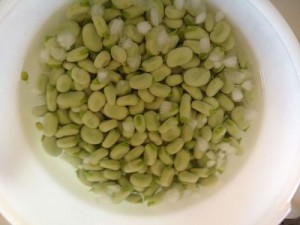 On that score, the favas took longest to prepare–shelling and peeling. I started with about twice this many pods (I didn’t think to take a picture till I was about half-way through shucking them) became a small bunch of beans with the shell, which I threw into boiling water for a minute and then ice water, then peeled to yield this many green succulent beans: Continue reading “Eating locally?”
On that score, the favas took longest to prepare–shelling and peeling. I started with about twice this many pods (I didn’t think to take a picture till I was about half-way through shucking them) became a small bunch of beans with the shell, which I threw into boiling water for a minute and then ice water, then peeled to yield this many green succulent beans: Continue reading “Eating locally?”
